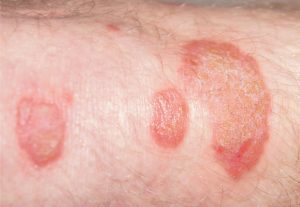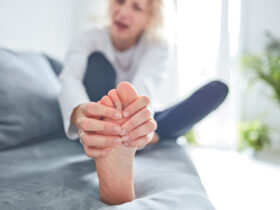By Joseph Onorato, MD, FAAD
 Psoriasis is an immune-mediated disease (a disease with an unclear cause that is characterized by inflammation caused by dysfunction of the immune system) that causes inflammation in the body. There may be visible signs of the inflammation such as raised plaques (plaques may look different for different skin types) and scales on the skin.
Psoriasis is an immune-mediated disease (a disease with an unclear cause that is characterized by inflammation caused by dysfunction of the immune system) that causes inflammation in the body. There may be visible signs of the inflammation such as raised plaques (plaques may look different for different skin types) and scales on the skin.
This occurs because the overactive immune system speeds up skin cell growth. Normal skin cells completely grow and shed (fall off) in a month. With psoriasis, skin cells do this in only three or four days. Instead of shedding, the skin cells pile up on the surface of the skin. Some people report that psoriasis plaques itch, burn and sting. Plaques and scales may appear on any part of the body, although they are commonly found on the elbows, knees, and scalp.
Inflammation caused by psoriasis can impact other organs and tissues in the body. People with psoriasis may also experience other health conditions. One in three people with psoriasis may also develop psoriatic arthritis. Signs of PsA include swelling, stiffness and pain in the joints and areas surrounding the joints. PsA often goes undiagnosed, particularly in its milder forms. However, it’s important to treat PsA early on to help avoid permanent joint damage.
Symptoms often start between ages 15 and 25 but can start at any age. Men, women, and children of all skin colors can get psoriasis. Psoriasis can appear anywhere on the body, even on the eyelids, ears, lips, skin folds, hands, feet, and nails. Plaques can be a few small patches or can affect large areas. It’s possible to have psoriasis plaques and scales in more than one location on the body at a time.
There are five types of psoriasis. It’s possible to have more than one type of psoriasis at one time and more than one type in a lifetime. Treatments may vary depending on the type and location of the psoriasis. While scientists do not know what exactly causes psoriasis, we do know that the immune system and genetics play major roles in its development. One thing we do know: psoriasis is not contagious. You cannot catch psoriasis from another person. Usually, something triggers psoriasis, causing symptoms to appear or worsen. Triggers vary from person to person.
Psoriasis triggers vary from person to person. What may worsen your psoriasis might not have any impact on someone else. Common psoriasis triggers include:
. Stress: Stress is one of the most common psoriasis triggers. At the same time, a psoriasis flare can cause stress. This may seem like an endless loop. However, relaxation techniques and stress management may help prevent stress from impacting psoriasis.
. Injury to Skin: Psoriasis can appear in areas of the skin that have been injured or harmed. This is a result of the Koebner phenomenon, which states scratches, sunburns, bug bites and vaccinations can all trigger a psoriasis flare.
. Illness: Anything that can affect the immune system can trigger psoriasis. That is why you may experience a flare following an ear infection, bronchitis, tonsillitis or a respiratory infection. There is a connection between streptococcus infection (strep throat) and guttate psoriasis, as it often triggers the first onset of guttate psoriasis in children. It is possible to have strep throat without showing symptoms. If you have had strep throat in the past, talk with your health care provider about getting a strep throat test if your psoriasis flares.
. Weather: The weather may trigger a flare. Cold weather can often cause psoriasis flares due to less sunlight and humidity, heated and drier indoor air, as well as stress and illness. Warm weather can often improve psoriasis because of natural sunlight and higher humidity.
. Other Possible Triggers: Although it is less common, some people with psoriasis suspect that allergies, certain foods, alcohol, or environmental factors trigger their psoriasis. A great way to learn about your unique set of triggers is to track them over time. Keeping records of your symptoms and triggers can help you anticipate and treat your flares.
As with other chronic diseases, psoriasis may affect areas of your life other than your physical health. Psoriasis may affect your emotional health, your relationships, and how you handle stress. It could even affect areas of your life that you wouldn’t expect, such as the clothes that you choose to wear. For some people, living with psoriasis can be a challenge. However, there are ways to handle those challenges so you can thrive with psoriasis.
The staff at SWFL Dermatology Plastic Surgery & Laser Center is dedicated to providing the most personalized care by treating their patients like family. Each provider is committed to taking the time to understand the concerns and goals of the patient in order to provide the best-individualized care for that patient.
What’s on YOUR Skin?
Contact SWFL Dermatology Plastic Surgery & Laser Center. Accepting most Florida & New York Insurance Plans including Florida Blue and GHI.
To improve the appearance and health of your skin, schedule a consultation today at SWFL Dermatology Plastic Surgery & Laser Center online or by phone at 239-500-SKIN.
Founder & Owner
Joseph Onorato, MD, FAAD
Dr. Onorato has over 25 years of experience practicing dermatology and is board certified. He serves as SWFL Dermatology’s medical director, encouraging his team to provide the best skin care services in the area. He focuses on general dermatology and dermatological surgery including laser treatments, chemical peels, and injectable fillers.
239-500-SKIN
SWFLDermatology.com
13800 Tamiami Trail N, Suite 112
Naples, FL 34110









